« October 2013 | Main | December 2013 »
November 29, 2013
My Rum Diary: Growing up Hunter S. Thompson.
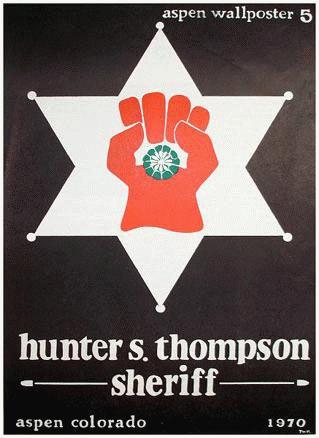
Kurtz. He got off the boat. He split from the whole goddamn program.
--Captain Willard, Apocalypse Now (1979)
Thompson had a way of keeping anyone unfriendly to the very idea of him beyond even mere curiosity. Just unaware. In that case, you were a nice person doing the best you could. You didn't "need it"--anymore than you needed to become good friends with Andy Warhol, Ralph Nader, Harry Dean Stanton, or Dr. John the Night Tripper, whoever they were.
--A Fan
Twenty years ago, when I was an associate in D.C. sweating everything, I worried a lot about something hanging in my office: a framed black, white and red "Hunter S. Thompson for Sheriff" election poster for a 1970 election in Aspen, Colorado.
The poster bore a Harvard Strike fist. Inside the fist there appeared to be what someone explained was a drawing of a plant which bad or crazy people chewed on to "get high". But I quickly realized that anyone who actually knew about Thompson and his books and articles on presidential politics, Las Vegas and the Kentucky Derby--the event in his hometown of Louisville was "decadent and depraved"--would likely like me for having it.
I was right. The poster meant nothing to most people who visited my office, and it even helped me make friends. In the 1970s and 1980s, people read and loved him or had never heard of him.
So you either "knew" HST--or you didn't.
He either delighted, or was too disturbing to explore. A talented and comical writer, he drank too much, really did like chemicals, hated Richard Nixon, upset people on the press entourage, freaked out editors, showed up drunk for "speeches", and arranged for Ed Muskie to be severely menaced on a train by one seriously funny outlaw rich kid named Peter Sheridan.
He liked weapons. He was once accused of firing a military rocket at a snowmobile. According to a friend of mine who worked for one of the TV news networks, Thompson once mysteriously and suddenly showed a handgun to Secret Service agents and reporters sitting in a booth in a famously silly Capitol Hill singles bar, mumbling "just in case there's a firefight..."
Even with that public life, Thompson had a way of keeping anyone unfriendly to the very idea of him beyond even mere curiosity. Just unaware. In that case, you were a nice person doing the best you could. You didn't "need it"--anymore than you needed to become good friends with Andy Warhol, Ralph Nader, Harry Dean Stanton, or Dr. John the Night Tripper, whoever they were.
Even after Thompson became a character in Garry Trudeau's Doonesbury, saw two movies based on his work, and died by his own hand in early 2005, most people didn't have a clue or want to. One exception in later years: "beer hippies" and GenX stoners finally discovered Thompson--"Gonzo, drugs, liberal stances, hey Hunter's my man"--and my guess is that he secretly looked down on them.
Well, anyone can be in his club at this point. But I needed it all along. He was an angry but fine writer, a humorist, an innovator--and a big hillbilly like me who grew up on the Mason-Dixon line and all along just wanted to fall in love. He still makes me laugh and cry.
Maybe there is no Heaven.
Or maybe this is all pure gibberish — a product of the demented imagination of a lazy drunken hillbilly with a heart full of hate who has found a way to live out where the real winds blow — to sleep late, have fun, get wild, drink whiskey, and drive fast on empty streets with nothing in mind except falling in love and not getting arrested.
Posted by JD Hull at 11:59 PM | Comments (0)
November 27, 2013
Gratitude: A Superior State of Mind.
For what else can I do, a lame old man, but sing hymns to the gods?*

Posted by JD Hull at 11:59 PM | Comments (0)
November 25, 2013
William Jefferson Clinton: The First Bubba in 2017?
Dang. In 2017 we might see Hillary Rodham Clinton, who will have turned 69 just before election day in 2016, sworn in as the nation's first female POTUS. Her White Housemate? One William Jefferson Clinton, who will then be 70. No matter what your politics, it does sound like fun. What, if anything, do you think about this? Can we hear from commentariat-pundit-pollsters like Mike O'Neil?

Posted by JD Hull at 11:59 PM | Comments (0)
November 24, 2013
Co-Workers: Please Oh Please Try To Steal My Clients.
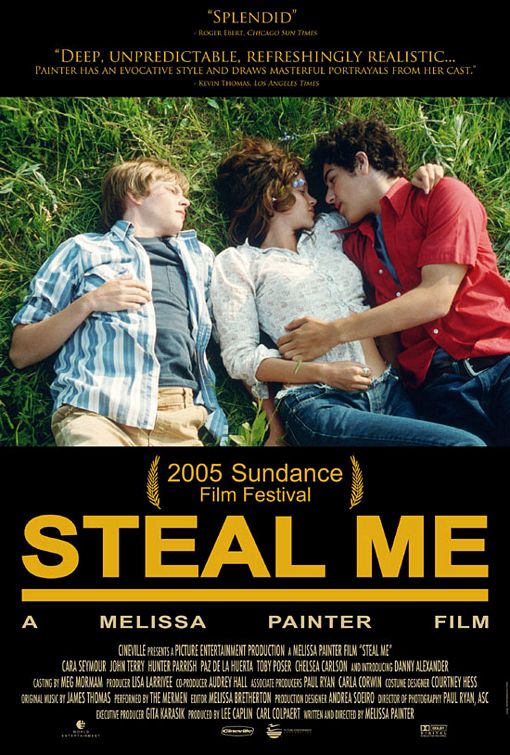
Lawyers--especially of the corporate variety--are far from the Fighters and Alpha People portrayed in Television Dramas and in the Media. We're among the most Fearful and Insecure Creatures on Earth.
If you find this performance review idea preposterous, please ask yourself why. We first mentioned the title's idea in a 2006 post. It attracted attention--but many people thought we were kidding. We weren't.
Some lawyer-writers tried to even analyze it, which was strange, and kind of sad. Lawyers--after actors, junior high kids at that first dance, and aging beauty queens just discovering pharmaceutical speed--have to be the most insecure creatures on earth. They think in terms of scarcity--never in terms of plenty.
Someone else is about to get something that is theirs.
Again, friends, it's time to have the courage of your convictions--and otherwise get "off your lawyer knees".
There are lots of suggestions out there on standards, guidelines and take-aways for associate reviews.
Two are (a) letting staff evaluate co-workers and partners on specific inter-office skills in writing, and (b) reviews of staff based on specific client service standards which ALL employees must buy into (i.e., pay increase for well done client service; hit the road, for the unwilling, clueless).
But we still like this one--which is no more discretionary and arbitrary than (a) and (b) above:
Every day, the client service by associates and paralegals should be good enough to permit those employees to actually steal any client, and take them to another law firm (use "transport" for "steal" if you need the PC professional services term), if they were to leave your shop tomorrow morning.
Period.
If you are not, in effect, willing to go that far with your own employees in instituting and daily demanding client service, you are neither confident about client loyalty (not to mention employee loyalty) nor really serious about delivering superior client service to your clients. You are a client-service fraud.
And your employees aren't in the game; they are not engaged in the work for clients, they are not stepping up.
A true client service culture has to be that "extreme". So let "them that can" whisk those clients out of your firm with a phone call or two; after all, that's only fair to the clients, if they so decide. If you find this idea preposterous, radical or just too disturbing, please think very hard about what you are really doing at your firm, and your real commitment, to build and lead a true client service culture.
At your shop, is "client service" just drinks-and-dinner b.s. for the clients, and website-and-brochure lip service for the public? Or is it real?
Posted by JD Hull at 12:59 AM | Comments (0)
November 20, 2013
Aldous Huxley: So many gods to chose from.
More people have died for their drink and their dope than have died for their religion or their country. The craving for ethyl alcohol and the opiates has been stronger, in these millions, than the love of God, of home, of children.
--Aldous Huxley, "Drugs That Shape Men's Minds", The Saturday Evening Post, October 18, 1958
Posted by JD Hull at 11:47 AM | Comments (0)
November 19, 2013
Writing Well: The Editor
I have performed the necessary butchery. Here is the bleeding corpse.
--Henry James (1843-1916), after a request by the Times Literary Supplement to cut 3 lines from a 5,000 word article.

Posted by JD Hull at 12:00 AM | Comments (0)
November 17, 2013
The Eddie Haskells of Litigation.
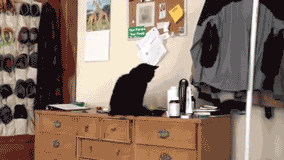
You know any law firms like this?
Posted by JD Hull at 10:36 PM | Comments (0)
November 16, 2013
Try This At Work: Change How Clients Think About Lawyers.
The work of a bricklayer goes to the blue.
The knack of a mason outlasts a moon.
The hands of a plasterer hold a room together.
The land of a farmer wishes him back again.--Carl Sandburg (1878-1967), author, editor, poet, Pulitzer winner.
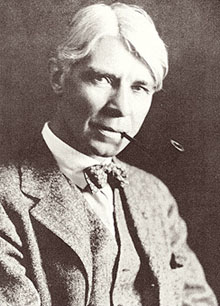
"The lawyers, Bob, know too much..."
But first: hearse horses, anyone? Do you love what you do? Step back from the canvas and try some simple tool sharpening. Bone up on your fundamentals, maybe. Your techniques. Do you need some new ideas? How does your firm do its work these days? Do you get things right? What do you teach associates?
Now step back further. What of this Lawyering Thing? Clients? What is it you really do for them? You serve, right? You mix your products and services with an overall experience that makes you unique, right? Or are you and yours indistinguishable from the rest of the generic law cattle out there? Is your firm really different?
Step back again.
Are you problem-solvers? Or just part of a "club" that needs clients as equipment to pursue a daily game? Does practicing law and serving turn you on?
Or is it just a past choice you, or your partners, made--one that hardened around you long ago--and now regret?
Too many people practice law who should not. Practicing law is hard.
Client service is just as hard. But many people with law degrees--there are way too many of us in the U.S.--don't get that. Or they don't love it. If either applies to you, or to your colleagues, it's not too late to "get it", to get it back, to love it (again or for the first time) or just to try something different and new.
The law is not for everyone. And to do it right day-in and -out is a hard order. A privilege, too.
If you wish to stay in the profession, try to make it what it can and should be. Visit our world-famous, annoying, counter-intuitive but dead-on accurate 12 Rules of Client Service. See "Rule Four: Deliver legal services that change the way clients think about lawyers".
Posted by Holden Oliver (Kitzbühel Desk) at 12:19 AM | Comments (0)
November 15, 2013
James Baldwin: "Tell Me How Long The Train's Been Gone."
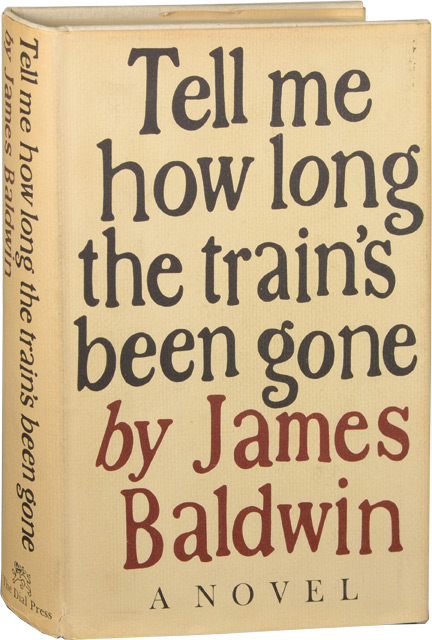
An essayist at heart, American novelist, poet and playwright James Baldwin (1924-1987) wrote his experimental fourth novel about the life of Leo Proudhammer, a black stage actor raised in Harlem who moves to Greenwich Village. Proudhammer has a heart attack on stage. Published in 1968, and panned by critics but widely read, "Tell Me How Long The Train's Been Gone" is an incredibly intense coming of age story set the 1930s and 1940s about racial prejudice, the American experiment, family, faith and sexuality.
Posted by JD Hull at 10:48 PM | Comments (0)
November 14, 2013
Redux: In a Global Services Economy, could "Ease of Use" ever catch on?
Get off your knees. Imagine a Better Standard. Get to work.
"Client Service" for professionals. It got to be a joke almost right away, don't you think? But it doesn't have to be a joke. Client Service. In our view, that huge gap between the promise and the reality has rendered the term nearly meaningless. Even for those who deeply care about the crusade of delivering "it", and see its value for client retention, "client service" eludes the best of us.
We had no idea that building a client service culture and keeping it would be so hard.
It's a mantra we repeat to ourselves, to our employees, and to our customers. We believe that if we say "it" enough, "it" will come. With the best intentions, service providers really do institute--but rarely work at and enforce--regime after regime of Client Service.
The reason: Client Service is much much harder than it looks. You weave your skills into a buyer's "experience" of them, and deliver them together as One Thing. CS is a hard-acquired habit. It never was easy. Never supposed to be easy.
Most of us gave up. So we just talked about "it" in promotional materials and at meetings. We didn't establish and enforce it. (And lots of the time, if we were honest, we'd admit to ourselves we really didn't know what it was. It's just "being nice" to clients, right?)

What if the services sector, now King, competed for clients and customers on the basis of "Ease-of-Use"? Develop and apply ease-of-use concepts for products and goods to pure services? To our clients' services?
And to our services? Law. Accounting. Consulting. Advertising. Newer and non-traditional services, too. Anything where a service (something valuable but "invisible") or product-service mix is part of what you pay for.
In other words, Ease-Of-Use for services.
"Ease of use" is already intuitive to large armies of managers and employees who work in any services industry and don't like Hallmark cards. They already get it. It just needs to be seized upon, delivered daily, and enforced at your shop.
Well, why not? Why wait for the "Who Swiped My Cheese?" crowd to write a few books? Services are pretty much Everything these days.
Services certainly represent the direction global markets now march--in good and bad times.
Consider for a moment just products. In 2006, The Folgers Coffee Company was awarded an Ease-of-Use Commendation by the Arthritis Foundation for its AromaSeal™ Canister. If you're a Folgers® drinker, you notice that Folgers® added an easy-to-peel tin freshness seal (no need for a can-opener), a new "snap-tight" lid and even a grip on its plastic red can.
Folgers® did it for coffee cans. IBM and CISCO have ease-of-use programs for the products they sell. The great companies many of us represent do spend money and expertise on making their goods, equipment and products usable.
Think about your car, your luggage, your TV remote (well, strike that one), your watch and even grips on household tools. Think about Apple, Dell and Microsoft. Each year they think through your experience with their products and try to make it better. Continuous improvement models for "things."
Develop and apply ease-of-use concepts to pure services? Our clients' services? Our services? Sure, why not? It's probably coming anyway, even while it will be infinitely harder to do for services than for products. WAC? has noted before that even corporate clients that sell goods see themselves as selling solutions and not products.
By 2005, services sold alone or as support features to the sale of goods and products accounted for over 65% of the gross domestic product (GDP) in the US, 50% of the United Kingdom's GDP and 90% of Hong Kong's. Even products sold by IBM and CISCO, now chiefly service companies, are part of a services-products mix in which the services component is the main event.
Law firms, of course, have always sold services. And we are a small but powerful engine in the growth of the services sector. We strategize with and guide big clients every day. While that's all going on--day in and day out--what is it like for the client to work with you and yours? Are clients experiencing a team--or hearing and seeing isolated acts by talented but soul-less techies?
Do you make reports and communications short, easy and to the point? Who gets copied openly so clients don't have to guess about who knows what? Is it fun (yeah, we just said "fun") to work with your firm? How are your logistics for client meetings, travel and lodging? Do you make life easier? Or harder? Are you accessible 24/7? In short, aside from the technical aspects of your service (i.e., the client "is safe"), do your clients "feel safe"?
What if law firms--or any other service provider for that matter--"thought through," applied and constantly improved the delivery of our services and how clients really experience them?
And then competed on it...?

(from several WAC? ease-of-use posts beginning in 2007)
Posted by JD Hull at 01:59 AM | Comments (0)
November 13, 2013
Builders. Innovators. Drivers. Creators.
There is no joy except in creation. There are no living beings but those who create. All the rest are shadows, hovering over the earth, strangers to life. All the joys of life are the joys of creation: love, genius, action...
--Romain Rolland (1866-1944), Nobel Prize winner, in "Lightning Strikes Christophe".
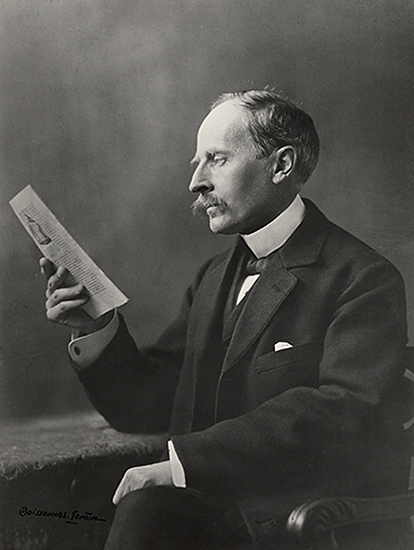
Posted by JD Hull at 11:59 PM | Comments (0)
November 12, 2013
Karl Llewellyn, Old Siwash and New Eyes.
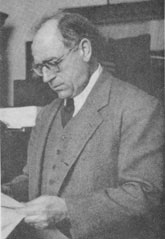
Karl Nickerson Llewellyn
You expect me to tell you that you should be earnest about your work, and get your back into it for dear old Siwash, and that he who lets work slide will stumble by the way.
The above of course is from the opening chapter of the The Bramble Bush: On Our Law and Its Study (1931), which sprung from a series of introductory lectures Karl Llewellyn (1893–1962) gave to first-year law students during the 1929-30 academic year, when he was appointed the first Betts Professor of Jurisprudence at Columbia. The book's title is from a poem "The Bramble Bush" by Robert Penn Warren, excerpted here:
There was a man in our town
and he was wondrous wise:
he jumped into a bramble bush
and scratched out both his eyes--and when he found that he was blind,
with all his might and maine,
He jumped into another one,
and scratched them in again.
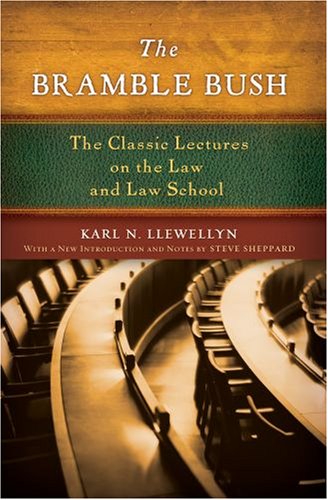
Posted by Holden Oliver (Kitzbühel Desk) at 11:59 PM | Comments (0)
Rule Seven: Know The Client.

You're a servant. Whatever your client does, find out about it. And find out in 3-D.
Rule Seven is from our wise, world-famous, tortuous and highly irritating 12 Rules which make their appearance here in some form roughly 50 times a year. Excerpt from Rule Seven:
The client, it seems, actually wants you to know him, her or it. Take time out to learn the stock price, industry, day-to-day culture, players and overall goals of your client. Visit their offices and plants.
Do it free of charge.
Associates in particular need to develop the habit of finding out about and keeping up with clients and their trials and tribulations in and out of the areas you are working in. Learn about your client--and keep learning about it.
Devise a system to keep abreast.
Posted by Holden Oliver (Kitzbühel Desk) at 01:00 AM | Comments (0)
The Federal Rules of Civil Procedure: Master Pretrial Coach. North Star. Exalted Teacher. Consigliere.
Yes, "read the rule..." The Federal Rules of Civil Procedure are remarkable and, well, amazing. They vibrate, hum and glow with the hard work of the few who have worked on them over the years. In your first year. Tenth year. Twentieth year. Fortieth year of practice. They are shorter and better (i.e., much easier to grasp) than any non-FRCP-based state counterparts. There are flaws and ambiguities--but precious few. You notice something different every time. You never take them for granted. Look. At. Them. Every. Time. Read the Advisory Committee Notes, too. They, too, are to the point--and lean. Start with the Rule. Read the Note. And Onward.

Posted by Holden Oliver (Kitzbühel Desk) at 12:13 AM | Comments (0)
November 11, 2013
November 11: "Though Poppies Grow In Flanders Fields."
Observed today as a day off work for many in the United States, Veterans Day is always on November 11, and comes to us from World War I, or the Great War. The first and most horrific of modern wars was officially over with the Treaty of Versailles in June of 1919. But November 11 is observed in about 60 (mostly Commonwealth nations) as Remembrance Day, Poppy Day or Armistice Day to mark the end of major fighting in World War I in the 11th hour of the 11th day of the 11th month of 1918, when Germany had signed the Armistice. As "Poppy Day", it derives its name from John McCrae's short but famous poem.
In Flanders Field
In Flanders fields the poppies blow
Between the crosses, row on row,
That mark our place; and in the sky
The larks, still bravely singing, fly
Scarce heard amid the guns below.We are the Dead. Short days ago
We lived, felt dawn, saw sunset glow,
Loved and were loved, and now we lie,
In Flanders fields.Take up our quarrel with the foe:
To you from failing hands we throw
The torch; be yours to hold it high.
If ye break faith with us who die
We shall not sleep, though poppies grow
In Flanders fields.--John Alexander McCrae (1872–1918). Poet, physician, Lieutenant Colonel of the Canadian Expeditionary Force. The poem first appeared in Punch in December of 1915.
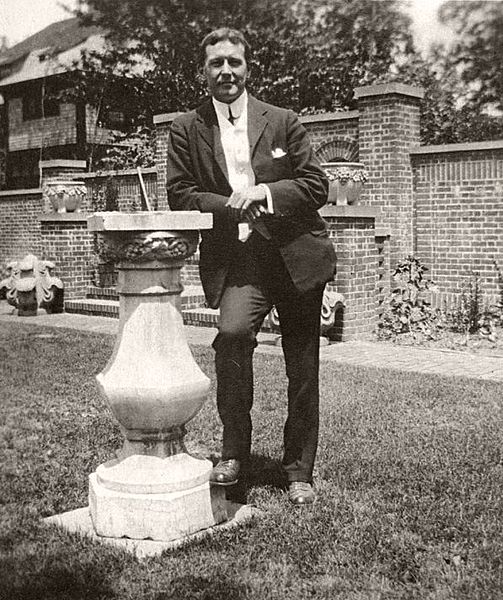
McCrae in 1912
Posted by JD Hull at 11:59 PM | Comments (0)
The Rules
.jpg)
1. Represent only clients you like.
2. The client is the main event.
3. Make sure everyone in your firm knows the client is the main event.
4. Deliver legal work that changes the way clients think about lawyers.
5. Over-communicate: bombard, copy and confirm.
6. When you work, you are marketing.
7. Know the client.
8. Think like the client--help control costs.
9. Be there for clients--24/7.
10. Be accurate, thorough and timely--but not perfect.
11. Treat each co-worker like he or she is your best client.
12. Have fun.
Copyright 2006-2013 John Daniel Hull. All Rights Reserved.
Posted by JD Hull at 08:32 PM | Comments (0)
November 10, 2013
Hôtel du Jeu de Paume: 54, rue Saint Louis en l'Ile.
"Welcome back, Monsieur Hool." This is Hôtel du Jeu de Paume, the non-oath version. Erected in the 17th century, it once housed a tennis court built by Louis XIII, king from 1610 to 1643. Beams from the early 1600s cross the ceilings. An interior garden. The walls: old books, newer original art. Neither Left or Right bank. Save for your 5th trip to Paris. The longstanding and competent staff takes a "working" dim view of both Americans and Brits. They are wonderfully rude, Paris smart, and Yankee-style industrious. A haughty Labrador even lives here full-time. This is Hull McGuire's hands-down favorite since 2003. Brits never stay here twice. Too French. Be late to breakfast at your peril. The staff does not merely leer and grin when it is says "no" or "impossible!". They laugh, too.

Posted by JD Hull at 11:59 PM | Comments (0)
November 09, 2013
Euripides: On Dog Fights.
Ten soldiers wisely led, will beat one hundred without a head.
--Euripides (480-406 BC)

Posted by JD Hull at 11:59 PM | Comments (0)
November 08, 2013
The Economist: Time for Britain to Turn Outward.
In the next five years, will Britain take a proactive role in the European community? Or will it turn inward? Will it lead, or merely observe the Continent from its reliable safe distance across the English Channel? Will the UK even stay in the European Union? Do see in this week's The Economist Little England or Great Britain? Excerpt:
Britain once ran the world. Since the collapse of its empire, it has occasionally wanted to curl up and hide. It can now do neither of those things. Its brightest future is as an open, liberal, trading nation, engaged with the world. Politicians know that and sometimes say it: now they must fight for it, too.
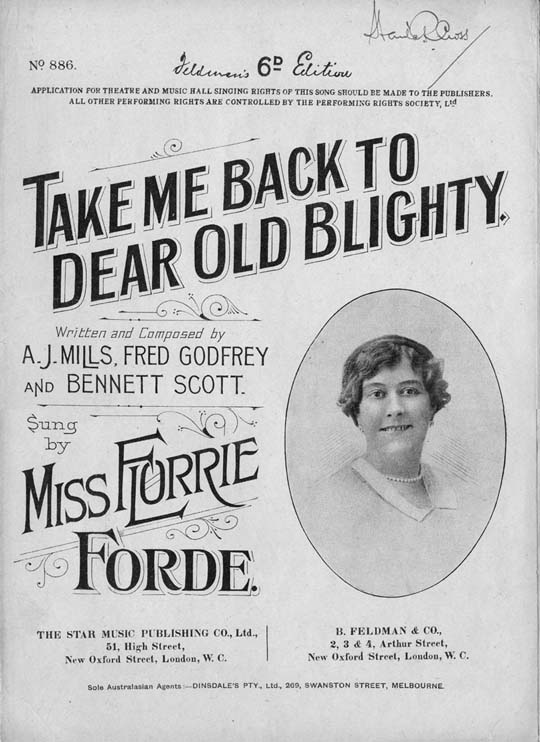
Posted by JD Hull at 09:39 PM | Comments (0)
November 06, 2013
Standards: Flaubert on his writing.
I am irritated by my own writing. I am like a violinist whose ear is true, but whose fingers refuse to reproduce precisely the sound he hears within.
--Gustave Flaubert (1821-1880)
Posted by Holden Oliver (Kitzbühel Desk) at 12:59 AM | Comments (0)
November 05, 2013
Qualify your clients. Get a system. Something...
J. Geils Band
Posted by JD Hull at 07:50 PM | Comments (0)
November 02, 2013
Storytelling: Henrik Ibsen's Hedda Gabler.
Great characters never go out of date.
When the lights go down and the curtain rises on the magic square of life, Ibsen's men and women will always hold the audience in their spell.
--S. L. Flaxman, January 1959, on dramatist Henrik Ibsen (1828-1906)
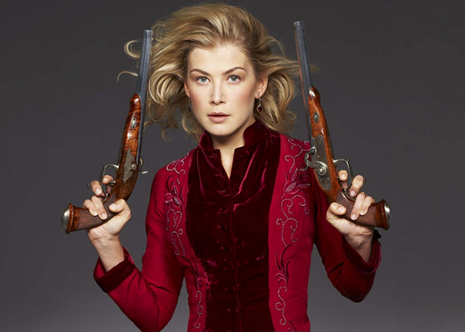
Making Blind Men See: Rosamund Pike, now 34 and still 5'9", in 2010 as Hedda Gabler at London's Richmond Theatre. Photo: John Swannell.
Posted by Holden Oliver (Kitzbühel Desk) at 11:59 PM | Comments (0)
November 01, 2013
Goodbye, Old Friend.
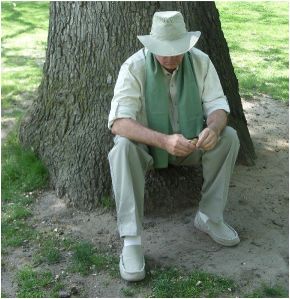
"Ed. Post" (? - 2013), the anonymous editor of Blawg Review. Thank you. Rest in peace. And make it count, sir. I am sorry we quarreled so much.
Posted by JD Hull at 11:54 PM | Comments (0)
The Economist on MLPs: "Gaming" Sarbanes-Oxley.
.jpg)
Under the U.S. Code, only certain businesses are permitted to become publicly-traded entities known as Master Limited Partnerships (MLPs). Most MLPs are fossil-fuel energy companies. Think major pipeline systems delivering natural gas, crude oil and refined fuels to end markets. MLPs offer the tax benefits of a partnership, the liquidity of publicly-traded stocks, the limited liability of a corporation and, importantly, the governance of a privately-held firm. See The Economist's new piece on MLPs in Subterranean Capitalist Blues and its typically snarky take on American finance "gaming" the corporate governance rules of Sarbanes-Oxley. Excerpt:
Time and again, the imposition of new burdens on businesses distorts the flow of money. Enron’s demise led to the Sarbanes-Oxley act, a well-intentioned law that changed the economic calculus for going public in America. Finance has yet to meet a rule it doesn’t want to game. Before the crisis, regulations that made it relatively expensive for banks to hold assets encouraged them, disastrously, to squirrel them away in off-balance-sheet vehicles.
Since the crisis, the regulatory burden on firms has shot up. Many of the new rules designed to make finance safer—raising capital levels, improving transparency in derivatives markets—are vital. Plenty are laudable: allowing “say on pay” votes for shareholders, for example. But the effect is the same: capital is again flowing to where frictions are lowest. As the constraints on regulated banks pile up, the global shadow-banking system grows: from $62 trillion in 2007 to $67 trillion in 2011.
Even when rules are rolled back, new distortions can easily result. The 2010 Dodd-Frank act permanently exempted smaller public companies from some of the most burdensome elements of Sarbanes-Oxley, for example. But some firms deliberately stay small in order not to pass thresholds that would trigger tougher rules. The perversity is breathtaking: rules to protect investors encourage firms not to grow.
Posted by JD Hull at 07:32 PM | Comments (0)